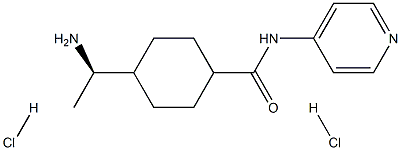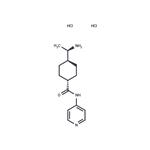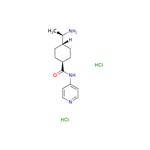Description
Y-27632 dihydrochloride (129830-38-2) is a specific inhibitor of ROCK family kinases.1 Enhances stem cell survival and proliferation in culture.2 Y-27632 dihydrochloride significantly improves freeze/thaw survival rate for human embryonic stem cells without influencing morphology, karyotype, cell surface markers, or differentiation potential.3
Uses
A cell permeable inhibitor of ROCK-1 and ROCK-2
Uses
Y-27632 dihydrochloride has been used:
- as a medium supplement in pancreatic ductal adenocarcinoma organoid culture
- in the inhibition of Ras homolog gene family (Rho) kinase in mouse embryonic stem cells
- in the inhibition of Rho-associated protein kinase (ROCK) in human embryonic stem cells and human induced pluripotent stem cells (iPSCs)
General Description
Y-27632 dihydrochloride is an effective bronchodilator and improves lung resistance (RL) induced by antigen and acetylcholine. Y-27632 controls neutrophil migration and lung edema and may be a potential drug for treating acute lung injury.
Biochem/physiol Actions
Y-27632 is highly potent, cell-permeable, selective ROCK (Rho-associated coiled coil forming protein serine/threonine kinase) inhibitor. Ki = 140 nM for p160ROCK. Y-27632 also inhibits ROCK-II with equal potency. The inhibition is competitive with respect to ATP.
References
1) Ishizaki et al. (2000), Pharmacological Properties of Y-27632, a Specific Inhibitor of Rho-Associated Kinases; Mol. Pharmacol., 57 976
2) Gauthaman et al. (2010), Effects of ROCK Inhibitor Y-27632 on Normal and Variant Human Embryonic Stem Cells (hESCs) In Vitro: Its Benefits in hESC Expansion; Stem Cell Rev., 6 86
3) Li et al. (2008), The ROCK Inhibitor Y-27632 enhances the Survival Rate of Human Embryonic Stem Cells Following Cryopreservation; Stem Cells Dev., 17 1079
4) Morel et al. (2018), Proteomics Reveals Scope of Mycolactone-mediated Sec61 Blockade and Distinctive Stress Signature Y-27632; Mol. Cell. Proteomics, 17 1750 [Focus Citation]
5) Yamazaki et al. (2020) Chromatin condensation retains the osteogenic transcription factor, RUNX2, in the nucleus of human mesenchymal stem cells; J. Biomechanical Science and Engineering 15? 1 [Focus Citation]




